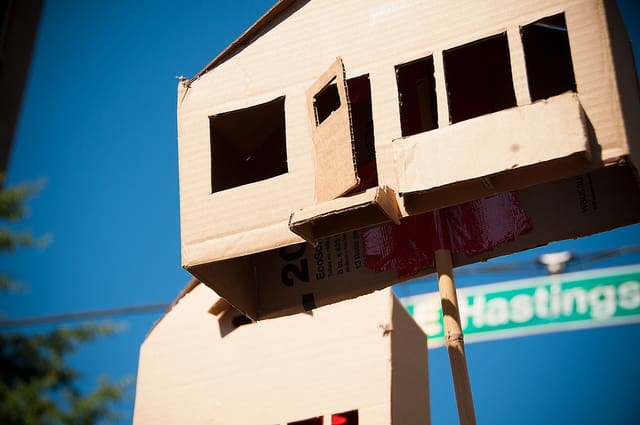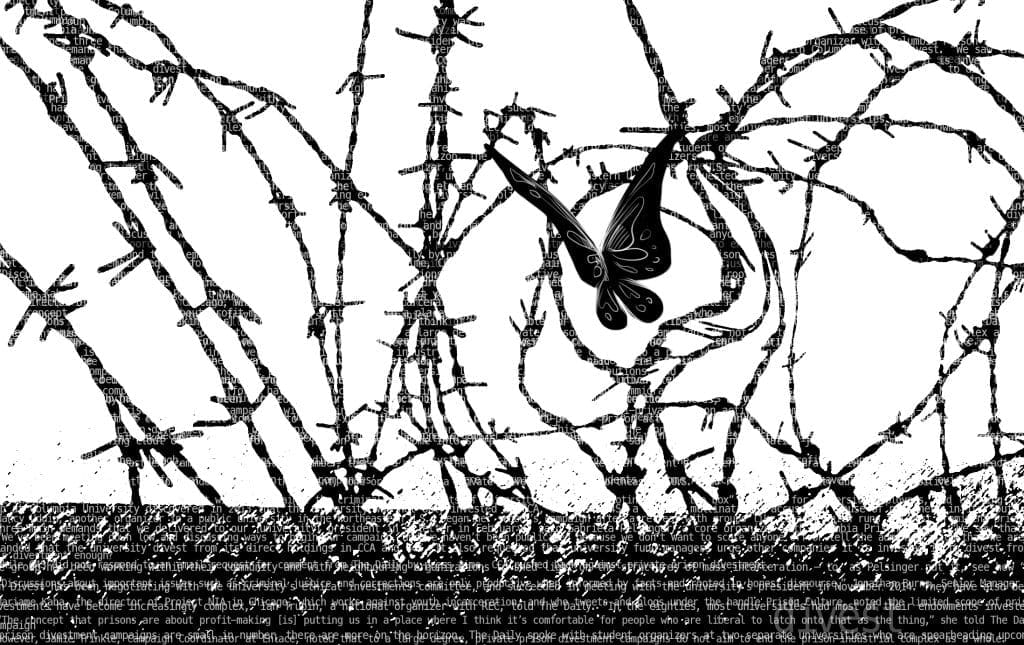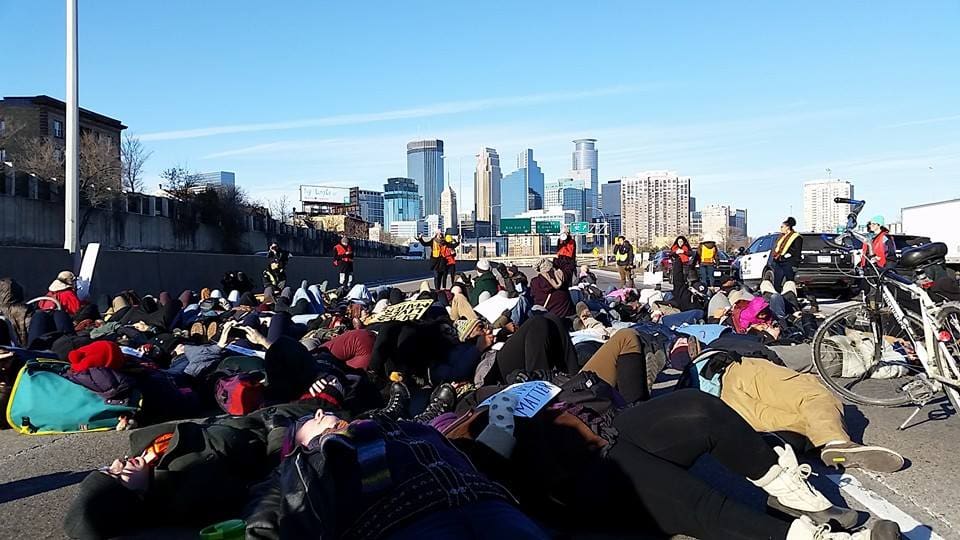Transcribed from the 5 March 2016 episode of This is Hell! Radio (Chicago) and printed with permission. Edited for space and readability. Listen to the whole interview:
Today, over half of poor renting families are spending at least half of their incomes on housing. Under those conditions, eviction is not always the result of irresponsibility. It’s more of an inevitability. If we don’t confront that, if we only try to address the problem of poverty with a focus on income and not a focus on housing, we’re not going to make as big a dent as we could.
Chuck Mertz: Millions of Americans are being evicted from their homes every year. The exploitation of the impoverished has become big business in the US, and eviction is not merely a symptom of poverty, but one of its major causes. Here to tell us what it’s like to be poor in today’s post-Clinton Welfare Reform America, sociologist Matthew Desmond is the author of Evicted: Power and Profit in the American City.
Welcome to This is Hell!, Matt.
Matthew Desmond: Thanks for having me.
CM: You write, “The home is the center of life. It is a refuge from the grind of work, the pressure of school, and the menace of the streets. We say that at home, we can be ourselves. Everywhere else, we are someone else. At home, we remove our masks. The home is the wellspring of personhood. It is where our identity takes root and blossoms; where as children we imagine and play, and as adolescents we retreat and try. As we grow older, we hope to settle into a place to raise a family or pursue work. When we try to understand ourselves, we often begin by considering the kind of home in which we were raised.”
And you point out how the Egyptian hieroglyph for “home” is often used in place of “mother;” the Chinese word 家 (jiā) can mean both “family” or “home.” After your study, how much do you think we take home for granted? Not only in our own personal lives, but in how important it is to a family, and to a community?
MD: I think that without stable shelter, without a decent, affordable home, everything else falls apart. It becomes impossible for us to invest in our communities, for our kids to stay in the same school. Many workers lose their job after they are evicted, because it’s such a consuming, stressful event.
Eviction erases the home. It takes a good deal of time and money to build a home, and often folks who are evicted lose not only the roof over their head but their possessions too, which are either piled on the street or taken by movers, and many people can’t afford the payments. The biggest moving company that does evictions in the city of Milwaukee told me that about seventy percent of the stuff they take in their eviction or foreclosure moves just gets hauled to the dump.
It was very clear to me, seeing families get evicted, how big of a loss the loss of a home is in their lives, and how eviction is not just a condition of poverty but a consequence of it, too. Those of us who have access to decent, affordable shelter know how important it is to our lives. We spend so much time trying to find the right neighborhood, the right home, the right school system. There are so many poor Americans now who are just taking whatever they can get, because they’re paying so much of their income to rent.
CM: I found this fascinating in your book: how when people think of someone being evicted, they think, well, yes, that’s a problem, you lose your home, but then eventually you get back into your home and the problem is solved. But you point out how eviction can be an enduring, lingering problem for a family.
How much does it endure as a problem for a family after being evicted?
MD: It’s enormous. It has an enormous mark on all aspects of a family’s life. For one, eviction comes with a record, just like a criminal record does. We know that if you have a criminal record it makes it really hard to get a job and get certain kinds of government assistance. It’s the same with an eviction record.
An eviction record can affect your credit. Many housing authorities treat evictions as marks against applications, so when your application comes up, you might be denied housing assistance. That means that the people arguably in most need of public housing, the evicted, are systematically denied it. Many landlords turn away families with a recent eviction on their record, and that’s why we know families relocate into worse neighborhoods, into worse housing.
Eviction also has an effect on your spirit. We found that mothers who were evicted report higher rates of depressive symptoms two years after the event. That leaves a deep and jagged mark on children, on the next generation.
And if you add all that up, it’s really hard not to conclude that eviction isn’t just a really hard day. It’s something that’s casting poor families onto a different and more difficult path.
CM: Is this more a women’s issue than an issue for men? Because I would think that if eviction has an especially negative impact on women, and especially on women of color, then it seems like Black Lives Matter—and I’m not saying they’re doing something wrong—would be focusing on eviction, or feminists would be focusing on eviction.
How much is eviction a women’s issue?
MD: The face of America’s eviction epidemic belongs to mothers and kids. If any of your listeners out there have been to an urban housing court, they know that this is true. They have seen row after row of just moms with kids in eviction court. In Milwaukee, most households that are evicted have children. It is disproportionately affecting low-income African-American communities and low-income Latino communities, and the mothers and the women within those communities.
Among Milwaukee renters, for example, one out of five black women reports having been evicted some time in their life, compared to one out of fifteen white women. The way I’ve come to understand this is that if incarceration has become typical in the lives of poor African-American men, eviction has become typical in the lives of poor African-American women. These women, and mothers particularly, are bearing the costs of eviction.
But the problem is also very widespread. One out of five of all renters in this country now report spending at least fifty percent of their income on housing. So this is something that’s affecting the old and the young; the sick, the able-bodied; immigrant communities, white communities, African-American communities.
CM: What’s missed in the discussion of poverty when the housing crisis is not addressed?
MD: We can’t fix poverty in America if we don’t fix housing. I think that most Americans who don’t live in trailer parks or who don’t live in poor neighborhoods still believe that the typical low-income family lives in public housing or benefits from some kind of aid from the government for their housing costs. But the opposite is true. Only one in four families that qualify for any kind of housing assistance receive anything.
And in some big cities, like Washington, DC, for example, the waiting list for public housing is not counted in years, it’s counted in decades. So a young parent who applies for public housing in our nation’s capital might be a grandparent by the time his or her application comes up.
Under those conditions, low-income families are spending more and more of their income on housing. Today, over half of poor renting families are spending at least half of their incomes on housing, and one in four of those families are spending over seventy percent of their income just on rent and to keep the lights on. Under those conditions, eviction is not always the result of irresponsibility. It doesn’t take much to push someone into eviction under those conditions. It’s more of an inevitability.
If we don’t confront that, if we only try to address the problem of poverty with a focus on income and not a focus on housing, we’re not going to make as big a dent as we could.
We need to know and understand a lot more about the neighborhood-level consequences of eviction. It’s a crucial point. It’s not only destabilizing families, but entire communities.
CM: But we’re told that the housing bubble and the financial crisis of 2008 was partly about George W. Bush’s “ownership society” and the government’s efforts to give access to home ownership to as many people as possible.
So can a housing shortage be addressed without repercussions to the greater economy that could eventually force the most marginalized back out of their new homes?
MD: It absolutely can. And this is a bigger problem than just the foreclosure crisis that we saw in 2008. This is something that was happening before the housing market collapsed, and it’s something that has continued after the housing market stabilized. The problem is that poor, renting families are giving most of their income to rent. We as a country can do something about that in a major way.
The book comes down on expanding housing vouchers. We already have a government program that provides housing assistance to the lucky minority of low-income families who receive it. And it works pretty well. You can take a housing voucher, and you can live wherever you like in a city, as long as your housing isn’t too expensive or too shoddy, and instead of paying 88% of your income to rent (like a woman I wrote about in the book named Arlene) or seventy percent of your income to rent (like Lorraine, who was my neighbor in the trailer park), you’re paying thirty percent of your income to rent. It would be a massive move in the right direction. It would change the face of poverty in this country. It would allow families to invest in their communities and themselves and their children.
We know from the research that’s out there that when families finally do receive a housing voucher, after years on the waiting list, they consistently do one thing with their freed up income: they go to the grocery store, and they buy more food, and their kids become stronger and less anemic. A lot of kids today who are part of poor renting families aren’t getting enough to eat because the rent eats first.
It is well within our capacity to do something more, and the good news is we already have a program that’s working pretty well. We just need to expand it.
CM: Why do you think funding a voucher system is better than funding a public housing system?
MD: It’s a really important point. Public housing in this country, when it was first built, was a refuge from the slum. It was seen as this amazing progressive step. When you hear interviews with families who moved into Pruitt-Igoe in St. Louis or Robert Taylor in Chicago, they’re amazed, and they’re grateful.
But then we defunded public housing in a major way, and we allowed these buildings to turn into slums themselves. That’s a crucial part of this story, and that has to be a story that’s told.
There’s no study out there that shows us that you can offer housing at equal quality for less cost if you build it versus if you provide a voucher. So vouchers are the most cost-effective way to deliver this, and they’re a way that we can deliver it on scale. I always come back to this problem of scale. Cities are different. One city has to build, and one city has to tear down. In high-cost cities, public housing, built housing, might be the most efficient way to do it.
So I invite a lot of different proposals. Maybe a universal housing voucher is just one of many solutions to this enormous problem. But it is one potentially transformative solution that would be cost-effective, and it would allow us not to repeat some of the failures of past interventions, like segregation. It could be an intervention that’s as big as the problem is.
CM: You quote Jane Jacobs writing in The Death and Life of Great American Cities: “The public peace, the sidewalk and street peace of cities, is not kept primarily by the police, necessary as police are. It is kept primarily by an intricate, almost unconscious network of voluntary controls and standards among the people themselves and enforced by the people themselves.”
You write, “Jacobs believed that a prerequisite for this type of healthy and engaged community was the presence of people who simply were present, who looked after the neighborhood. She has been proved right. Disadvantaged neighborhoods with high levels of collective efficacy—the stuff of loosely-linked neighbors who trust one another and share expectations about how to make their community better—have lower crime rates.”
Does the housing crisis among the poor, then, lead to the crime problem? And if it does, why has this connection not been made by those who advocate for more security and law enforcement?
MD: It’s a crucial point. This dawned on me when I was spending time with the Hingston family in Milwaukee. The Hingstons were a big family, and they were living in an apartment that they loved, and they loved their neighborhood. Through a series of events, they fell behind. There was a shooting on the block, and a bullet whipped through their window, and that set off a chain of events that left them evicted.
Like many other evicted folks, they had to settle. They settled for a smaller place, a run-down place, in a neighborhood that they didn’t like. Someone like Doreen Hingston, who is this porch-sitting grandmother, who invested in her old neighborhood, who looked out, who knew her neighbors, who organized parties, who yelled at the kids on the street when they were acting up—if you take her and remove her from the neighborhood, that neighborhood loses eyes on the street. It loses a stabilizing presence.
But her new neighborhood didn’t gain one. Because Doreen didn’t think she would be there for very long. She didn’t invest in the neighborhood; she didn’t like it. She didn’t like her new place. She did end up staying there for a while, because she was stuck, but it wasn’t the same.
We see this in statistical data too. We know that in Milwaukee, neighborhoods that have high eviction rates have higher crime rates the following year. That makes a lot of sense from what we know about how neighbors contribute to driving down crime. In neighborhoods where you look down the block and a quarter of the people—or even a tenth of the people—aren’t going to be there by the end of the year, it’s really hard to build the stuff of community that’s necessary for preserving public safety and instigating civic responsibility.
Poverty isn’t just a reflection of lower incomes; it’s also an expression of extractive markets. People like my landlord at the trailer park don’t make money off of poor neighborhoods in spite of their poverty, but because of it.
CM: You write that “a single eviction could destabilize multiple city blocks. Not only the block from which a family was evicted, but also the block to which they are begrudgingly relocated. In this way, displacement contributes directly to what Jacobs called ‘perpetual slums’: churning environments with high rates of turnover and even higher rates of resentment and disinvestment.”
How much, then, does the housing crisis lead to concentrated blight?
MD: It’s a major factor. The fact that so many people are moving around and ending up in places they don’t want to be is directly related to things compounded mobility: a lot of families getting evicted don’t move once but twice. They move once into a place that they don’t want to be—that they have to settle for—and then they work hard to try to get out of that neighborhood.
So the residential instability that eviction causes isn’t just about displacing a family from one house. It can trail and travel across neighborhoods. We need to know and understand a lot more about the neighborhood-level consequences of eviction. It’s a crucial point. It’s not only destabilizing families, but entire communities.
And schools, for that matter. Children lose their schools, and lose their church groups, and lose the opportunity to have relationships with their neighbors. If we want stable communities and stable housing, we have to have a lot fewer evictions.
CM: Has eviction become big business? The market, as always, is supposed to solve all problems. But it seems, in this case, that the market is actually leading to more exploitation and more profiteering off of the poor.
How did we get into a situation where we have poverty-profiteering?
MD: When I started this work, I lived in a trailer park and rented a trailer there. It was a trailer park that had 131 trailers. It was probably the worst trailer park in the city of Milwaukee. It’s considered an environmental biohazard by the city because it has so many code violations. I spent some time with that landlord, my landlord and building manager, and reviewed his books so I could take into account missing payments, vacancies; I looked at his mortgage and his tax records, his water bill, his electricity. I tried to add up all his expenses, and pay attention to how much money was actually coming in (about a third of the trailer park was behind in any given month).
I’m going on and on like this so you’ll believe me when I tell you that the landlord of this trailer park, by my estimate, took home over $470,000 a year after expenses. That’s a lot. That means that he was making, every year, on average, thirty times what his tenants working full time for minimum wage were making—and fifty times what his tenants receiving disability were taking in.
Poverty isn’t just a reflection of lower incomes; it’s also an expression of extractive markets. People like my landlord at the trailer park weren’t making money off of poor neighborhoods in spite of their poverty, but because of it. What makes owning a home in poor neighborhoods a risky investment—low property values—often makes renting out there potentially lucrative. You can buy property for lower amounts and you have lower assessment, lower tax bills, but you can rent it at a decent amount.
The rent for a two-bedroom apartment in Milwaukee’s poorest neighborhoods—and these are really poor neighborhoods, over forty percent poverty—is only fifty dollars less on average every month than the city-wide median. So you have an opportunity to buy on the cheap and rent lower (but not that much lower), and the profit margins, like I learned from my trailer park landlord, can be quite staggering.
CM: You point out the professionalization of property management, and how that adds to the potential for evictions to happen. So the other thing that I’m concerned about is the way in which large financial institutions are now getting involved within the rental market. We spoke with Laura Gottesdiener back in 2014 about how buying houses cheap and then waiting for them to appreciate isn’t the only way Blackstone is making money on these deals. They are now securitizing rental payments, and they’re joining forces with groups like Credit Suisse and Deutschebank.
In your experience, did you see the problem being exacerbated by speculators and large property management companies coming in and taking over the housing stock?
MD: This research started in 2008, and in some ways I had a front row seat to how the housing crisis and foreclosure collapse was affecting landlords. The landlords who were losing properties were the small time mom-and-pop landlords. I think this is a story that often got lost in the media a bit. In some places, like in LA, one out of every two foreclosures was a rental property. Landlords were affected by these forces as well.
So a lot of small time landlords were losing properties, and more established landlords were picking them up. They’re the ones that had the capital that would allow them to do it. You’ll remember that at the time, the banks and other lending institutions became pretty conservative, and they would require twenty or thirty percent down-payment. The folks who had that often were the larger holders. That suggests—and it only suggests, because we do need a lot more empirics on this question—that property in our cities might become concentrated in fewer and fewer hands. Think of it as the Walmartization of property ownership.
If that’s the case, it could have big implications on rents, but so does just the professionalization of the market—you know, how landlords make decisions. If you’re my landlord, and someone in my family dies or I have an unexpected medical expense or something happens, I might be able to go upstairs, knock on your door, and say, “Gosh, you know, this happened—would you give me a break? Would you allow me to work it off for you? Can we work something out?”
But if my home is owned by a property management company that owns hundreds and hundreds of units and I’ve never even met my landlord, that kind of conversation becomes harder. I think that’s concerning for poor Americans who are already crushed by the high cost of housing.
CM: Matthew, thank you so much for being on This is Hell!
MD: Thanks a lot for having me.





